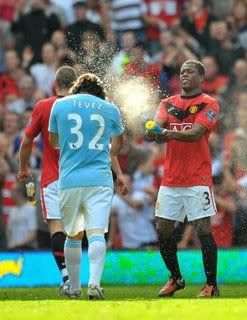Post by Vidic>Superman on Apr 3, 2008 8:41:25 GMT
The bodies of the five people who died when a private jet crashed into a housing estate in Farnborough, Kent, are being removed from the scene.
Police said they hoped to recover the remains of those who died in Sunday's disaster by the end of Monday.
Air accident experts are combing the wreckage and are expected to complete their investigations by Wednesday.
Two pilots and three passengers died when the Cessna jet came down and burst into flames not long after take-off.
No "black box" flight recorders were fitted on the jet because they are not required on planes registered in a private capacity, investigators said.
But police said the Air Accidents Investigation Branch (AAIB), which is being assisted by experts from the RAF, the US and Canada, was confident that enough information about the cause of the crash could be gathered from the scene and eye witnesses.
Ex-touring car racer David Leslie, team owner Richard Lloyd and pilot Mike Roberts were among those who died during the business flight from nearby Biggin Hill airfield to France.
Passenger Christopher Allarton, 25, and co-pilot Michael Chapman, 57 are also thought to have perished, although formal identification of all five on board will not happen for some time.
'Engine vibrations'
In the moments before the crash, the pilot reportedly told air traffic control of severe engine vibrations and asked for permission to land again.
But the Cessna Citation 1 jet came down short of the airport in Romsey Close, Farnborough, at about 1430 BST.
Residents, who watched in horror as the plane plummeted with a loud "roar", said it was a "miracle" that no-one on the ground was badly injured. Two people were treated for shock and two houses were hit.
Stephen and Peter Hale, the sons of the couple whose house was destroyed, said their parents had a narrow escape.
"There would have been no chance if they'd been inside the property and on a normal Sunday afternoon they probably would have been there," said Peter.
"Had it been an hour earlier, my mother, her brother and his partner would have been inside the house."
He said the house was regarded as just "bricks and mortar" by his parents, Ed and Pat, who had lived in the property for "years and years", "We're thankful they're alive, they're thankful they're alive," he added.
Seven families in the close had been evacuated after the crash, all except those in the two damaged houses should be able to return home by the end of Monday, police said.
'Racing's loss'
Family liaison officers were in contact with families of the victims.
Mr Leslie, 54, who was born in Dumfriesshire, was best known for winning nine races in a 13-year touring car career in the Super Tourer era of the 1990s.
Friends have described him as a "good and kind" man who helped younger racing drivers, including David Coulthard.
It is thought he was working on setting up the new Jaguar racing team with fellow victim Richard Lloyd, 63, the boss of Apex Motorsport.
Colin Hilton, chief executive of the Motor Sports Association, said Mr Lloyd was a successful driver, but: "it was as a team manager and owner that Richard really made his name, working with some of the best drivers in the world and winning numerous titles."
Floral tributes have been laid at the scene to pilot Mike Roberts, who eyewitnesses said made a desperate bid to try and avoid houses as the plane came down.
Douglas Field, 71, his friend of a decade, called him a hero, adding: "We are all shocked by this because he was one of those outstanding figures, a tremendous person."
Accidents 'rare'
Mike Wells, Mr Roberts' business partner for 15 years, said the pilot would have done "everything in his power to minimise the effects of this tragic incident on his colleagues, passengers and people on the ground".
BBC transport correspondent Tom Symonds said accidents were rare among Cessna jets.
Engine failure at or just after take-off is one of the most serious problems a pilot can face, because the plane is at a low altitude, climbing at a lower speed, and full of fuel.
A pilot named as John, who was landing another plane at Biggin Hill at the time, heard the mayday call. The Cessna pilot reported "severe engine vibrations", he said.
He told the BBC: "You could hear the alarms in the cockpit.
"The pilot came back over the radio a second or two later and said 'We're going down, we're going down'.
"The radio stayed live, and as I turned off the runway I looked back and I saw the plane basically drop out of the sky.
"And then the radio went dead and black smoke came up from over the hill."
The plane's wreckage will later be taken to the AAIB's headquarters in Farnborough, Hampshire, for examination.
Another tragic loss to the world of motor sport, thoughts go out to all the families of the men killed in this horrible accident.
Police said they hoped to recover the remains of those who died in Sunday's disaster by the end of Monday.
Air accident experts are combing the wreckage and are expected to complete their investigations by Wednesday.
Two pilots and three passengers died when the Cessna jet came down and burst into flames not long after take-off.
No "black box" flight recorders were fitted on the jet because they are not required on planes registered in a private capacity, investigators said.
But police said the Air Accidents Investigation Branch (AAIB), which is being assisted by experts from the RAF, the US and Canada, was confident that enough information about the cause of the crash could be gathered from the scene and eye witnesses.
Ex-touring car racer David Leslie, team owner Richard Lloyd and pilot Mike Roberts were among those who died during the business flight from nearby Biggin Hill airfield to France.
Passenger Christopher Allarton, 25, and co-pilot Michael Chapman, 57 are also thought to have perished, although formal identification of all five on board will not happen for some time.
'Engine vibrations'
In the moments before the crash, the pilot reportedly told air traffic control of severe engine vibrations and asked for permission to land again.
But the Cessna Citation 1 jet came down short of the airport in Romsey Close, Farnborough, at about 1430 BST.
Residents, who watched in horror as the plane plummeted with a loud "roar", said it was a "miracle" that no-one on the ground was badly injured. Two people were treated for shock and two houses were hit.
Stephen and Peter Hale, the sons of the couple whose house was destroyed, said their parents had a narrow escape.
"There would have been no chance if they'd been inside the property and on a normal Sunday afternoon they probably would have been there," said Peter.
"Had it been an hour earlier, my mother, her brother and his partner would have been inside the house."
He said the house was regarded as just "bricks and mortar" by his parents, Ed and Pat, who had lived in the property for "years and years", "We're thankful they're alive, they're thankful they're alive," he added.
Seven families in the close had been evacuated after the crash, all except those in the two damaged houses should be able to return home by the end of Monday, police said.
'Racing's loss'
Family liaison officers were in contact with families of the victims.
Mr Leslie, 54, who was born in Dumfriesshire, was best known for winning nine races in a 13-year touring car career in the Super Tourer era of the 1990s.
Friends have described him as a "good and kind" man who helped younger racing drivers, including David Coulthard.
It is thought he was working on setting up the new Jaguar racing team with fellow victim Richard Lloyd, 63, the boss of Apex Motorsport.
Colin Hilton, chief executive of the Motor Sports Association, said Mr Lloyd was a successful driver, but: "it was as a team manager and owner that Richard really made his name, working with some of the best drivers in the world and winning numerous titles."
Floral tributes have been laid at the scene to pilot Mike Roberts, who eyewitnesses said made a desperate bid to try and avoid houses as the plane came down.
Douglas Field, 71, his friend of a decade, called him a hero, adding: "We are all shocked by this because he was one of those outstanding figures, a tremendous person."
Accidents 'rare'
Mike Wells, Mr Roberts' business partner for 15 years, said the pilot would have done "everything in his power to minimise the effects of this tragic incident on his colleagues, passengers and people on the ground".
BBC transport correspondent Tom Symonds said accidents were rare among Cessna jets.
Engine failure at or just after take-off is one of the most serious problems a pilot can face, because the plane is at a low altitude, climbing at a lower speed, and full of fuel.
A pilot named as John, who was landing another plane at Biggin Hill at the time, heard the mayday call. The Cessna pilot reported "severe engine vibrations", he said.
He told the BBC: "You could hear the alarms in the cockpit.
"The pilot came back over the radio a second or two later and said 'We're going down, we're going down'.
"The radio stayed live, and as I turned off the runway I looked back and I saw the plane basically drop out of the sky.
"And then the radio went dead and black smoke came up from over the hill."
The plane's wreckage will later be taken to the AAIB's headquarters in Farnborough, Hampshire, for examination.
Another tragic loss to the world of motor sport, thoughts go out to all the families of the men killed in this horrible accident.






